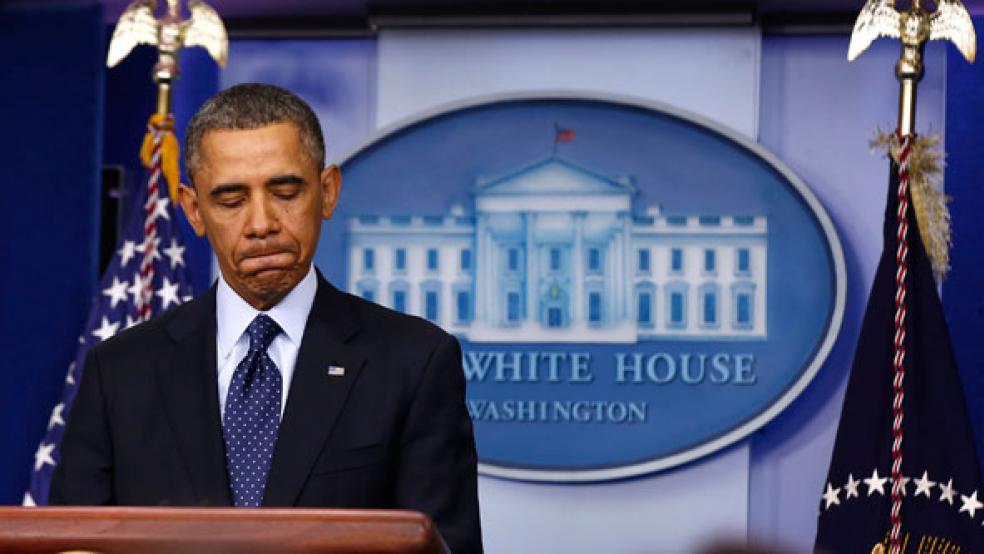Any lingering hopes about replacing the $85 billion of across-the-board sequester cuts were crushed Friday morning at the White House. The hour-long meeting with President Obama and congressional leaders ended with both sides hardening their opposing views and sharpening their words, as the cuts begin to take hold this weekend.

Republican House Speaker John Boehner of Ohio and Senate Minority Leader Mitch McConnell of Kentucky essentially told Obama what they’ve been saying publicly -- that they would rather see major random cuts in defense and domestic programs than bend to the president’s demand for a “balanced” substitute that included new revenues from closing tax loopholes.
Almost two months of posturing after the fiscal cliff deal—which averted a tax hike on 99 percent of the country but raised rates on the wealthiest—left them stuck in the ruts of their talking points about revenues. This is the new normal in Washington.
“Let’s make it clear that the president got his tax hike on Jan. 1,” Boehner told reporters after the meeting, noting the nearly $700 billion of tax increases that were part of the fiscal cliff deal. “The discussion about revenue, in my view, is over. It’s about taking on the spending problem here in Washington.”
Obama, again, declared he would not tolerate a long-term deficit reduction strategy that cuts spending that benefits middle class Americans while giving prosperous Americans and corporate leaders a pass. “It may take a couple of weeks, it may take a couple of months, but I’m going to just keep on pushing on it,” Obama said. “And my view is that ultimately, common sense prevails.”
But “ultimately” is a long timeframe for a president whose term ends in four short years—and the previous three years did not produce much momentum for cooperation.
Absent some improbable and yet-to-be-seen change of heart, a new fiscal policy reality has begun to emerge that will largely dictate spending and tax policy for the foreseeable future. The failure this week of the Senate and House to reach an agreement on a way to block or blunt the effects of the automatic cuts means that sequestration will be baked into the budget baseline going forward.
Congress and the White House approved relatively stringent multiple-year spending caps as part of the Budget Control Act of 2011 that have largely dictated discretionary spending by the government ever since. Now, an additional $1.2 trillion of spending cuts for the coming decade have been layered over that spending blueprint, which will have serious consequences for the Defense Department, other major federal departments and agencies, and state and local governments .
Last week, in meetings with liberal activists, administration officials suggested that they hoped to persuade Republicans to cancel the sequester as part of negotiations over the funding bill needed to keep the government open beyond March 27, when the current stop-gap spending resolution is set to expire, the Washington Post reported today.
Yet Boehner announced today that the House will vote next week on a bill that would keep government funding at sequester levels for the remainder of the fiscal year while providing new flexibility to manage the cuts at the Pentagon and the Department of Veteran Affairs.
“I’m hopeful that we won’t have to deal with a threat of a government shutdown while we’re dealing with the sequester at the same time,” Boehner said this morning. “The House will act next week and I hope the Senate will follow suit.”
In other words, Boehner and other congressional Republican leaders have given up on trying to block the implementation of sequestration, as they tried with two bills last year, and instead are embracing the automatic cuts as a convenient tool for achieving tough deficit reduction that they couldn’t hope to extract from the administration.
Sequestration was once viewed with dread by many conservatives who were concerned about the effect of the cuts in hollowing out the military and tossing hundreds of thousands of defense industry employees out of work. Not anymore. Tea-Party style conservative activists in the House Republican Study Committee view sequestration as a means of fighting for conservative principles and forcing Washington to begin living within its means.
Boehner has had a stormy relationship with conservatives, dating back to his secret negotiations with Obama over the debt ceiling in 2011. He has a tenuous hold over control of the House, and saw a handful of his own members vote against his reelection as speaker in January. He has found it far easier to get along with them now by simply standing backing and allowing sequestration to happen. .
Obama told reporters after this morning’s meeting that, “I recognize Speaker Boehner has challenges in his caucus,” and it would l be difficult for him to be seen once again trying to cut a deal with a president who many conservatives believe is the devil incarnate with “horns on my head.”
Obama insists he is optimistic Republicans will eventually come around to supporting changes in sequestration, as their constituents gradually feel the pain of cuts in defense contracting, education, Head Start, health care and other aide to the states. Yet he acknowledges he will have to live with the sequester as part of any future spending plans.
Asked by a reporter whether he would sign legislation extending the continuing resolution beyond March 27 if it included the cuts mandated by the sequester, the president said he probably would have to if it reflected the spending targets outlined in the Budget Control Act that he signed into law.
A deal is a deal, he said, and if the sequester is part of that deal, then he would have to “abide by those additional cuts.”





